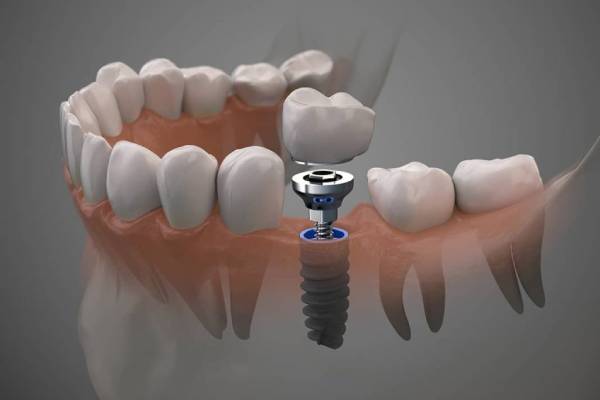Table of Contents
The doctor replaces your tooth roots with metal, screw-like posts during dental implant surgery in Iran. During this surgery, your lost tooth is replaced with a replacement that looks and functions like a natural tooth. Dentures or bridgework can be replaced with dental implants, a suitable option. Because a denture or dental bridge may not be possible due to a lack of natural tooth roots, dental implant surgery may be the best choice for replacing a lost tooth.
Several processes are involved in dental implant surgery. In general, how dental implant surgery is carried out is determined by the kind of implant and the state of your jawbone. The significant benefit of dental implant surgery and implants is that your new teeth will be solid and stable. The prosthesis must be put in your gums during dental implant surgery.

As a result, your jawbone plays a significant part in the procedure for a firmer implant, as a cavity in the jawbone will be created for dental implant placement. As previously stated, this will aid the implant’s lant’s durability. The recovery of your jaw after dental implant surgery is dependent on several factors, including the quality dentist’s work, your jaw health, and so on.
It may take many months for the jaw to recover completely following dental implant surgery. The benefits and drawbacks of dental implants and pre-and post-operative instructions are thoroughly covered in this article by The Amitis Health Tourism Company.
Advantages of Dental Implant Surgery
Dental implant surgery may offer benefits that other dental alternative methods cannot (such as dentures or bridges), some of which have been mentioned in this article from The Moj Aramesh Amitis Health Tourism Company, including:
It Just Matches Your Natural Teeth
Dental implants come in a wide variety of shapes and sizes. Your dentist will design implants for you based on your teeth positions so that the implant will match the color of your natural ones, perfectly fits in your mouth, and does not harm surrounding teeth. Implants will look so natural and fit that no one will know about them except you and your dentist.
Restores Bite Force
Since implants are anchored into the jawbone via a titanium post (replacing tooth root), you can bite more or less the same amount of force you could use with your natural ones. Other tooth replacement options do not restore nearly as much of your bite force because they sit on top of the gum and aren’t anchored.
Prevents Changes in The Shape of Your Face
Your teeth have an essential role in the shape of your face. By losing teeth, you lose the support of your facial structure, making you appear older. Dental implants support your face just like your natural teeth do.
Restores Normal Speech
Using teeth alternative options, such as dentures, can affect your speaking ability. A missing tooth may interrupt your normal speaking, such as mispronouncing words. Since implants function like natural teeth, they will restore your natural speech.
The pros and cons of dental implants were thoroughly discussed in this article from The Moj Aramesh Amitis Health Tourism Company. Keep in mind that the advantages and complications of this surgery may vary for each individual. Therefore, visit a dentist to get more information about it.

Dental Implant Surgery Pre-Operation Instructions
Some of the steps and specializations required for dental implant surgery are:
- A dental specialist examines the patient’s clients oral health state
- Oral and maxillofacial surgeon
- A dentist specializing in the treatment of preservative structures of teeth, such as gums and bones (periodontist)
- A dentist who designs dentures for dental implants and prostheses based on the applicant’s cant’s condition and suitable for the person’s jaw and gums (prosthesis specialist)
- In some cases, an ENT specialist may also be required. One or more surgeries may be required to implant the prosthesis into the gums and jawbone fully. Therefore, you should have a thorough evaluation to prepare for dental implant surgery. Some of the steps you should take before having dental implant surgery are:
Comprehensive Dental Examination
Dentist’s examination, 3D images of your teeth may be taken using X-rays to show your teeth and gum details. The dentist usually advises you to do this (taking different images of your teeth, called OPG) for more accurate modeling of your teeth.
Review oPatient’sient’s Medical History
Reviewingpatient’sient’s medical records: You should inform your doctor about any illnesses you are involved in and any medications you take (including over-the-counter drugs and supplements). If you have a specific heart condition or orthopedic implants have been used in your body, the dentist may prescribe different antibiotics before undergoing dental implant surgery to help to prevent possible infections after the surgery.
Treatment Plan
At this stage, the amount of damage to your teeth, the number of teeth requiring surgery and replacement, and the condition of the jawbone and the remaining teeth will be examined by the dentist. Tailored to your condition, the dentist will consider the best way to perform implant surgery on your teeth.
After dental implant surgery, you may feel severe pain in your jaw, gums, and other teeth. Therefore, the dentist will use different anesthetic drugs to control the pain, including local anesthesia, sedatives, or even general anesthesia. You need to talk to your dentist about the best option for you. Your medical care team or dentist will instruct you about eating and drinking, depending on your anesthesia.
You should consider all the health tips and instructions recommended by your dentist or medical care team before having dental implant surgery. If you have sedation or anesthetic during your dental implant surgery, it is recommended to plan to have someone take you home after the surgery. It would help if you rested the remainder of the day after dental implant surgery. Therefore, it will be essential to have someone accompany you in your daily tasks.
Who is dental implant surgery suitable for?
In general, dental implants may be right for you if you:
- You have one or more missing teeth.
- Your jawbone has reached total growth.
- Have healthy oral tissues.
- Do not have good health conditions that affect jawbone healing.
- You cannot or do not want to use dentures.
- You want to reinforce your speech.
- You are willing to commit several months to process.
- You decide to quit smoking.
During Dental Implant Surgery
Prepared implants are surgically placed in the gums and jawbone during dental implant surgery. These implants are a suitable alternative for the root of missing teeth. Because the titanium in implants fuses with the jawbone, implants do not slip or move, rattle, or do no harm to the jawbone. Unlike your teeth, these implants do not decay.
Dental Implant Surgery Post-Instructions
After undergoing dental implantation, you may experience some complications, including:
- Swelling of the gums and face
- Bruising of the skin and gums
- Pain at the implant site
- Minor bleeding
Antibiotics or painkillers may be prescribed for you after the surgery. Visit your oral surgeon if you have experienced any pain, swelling, or other complications worsening over the days after the surgery. To speed up your healing process after each stage of dental implant surgery, you may need to consume soft food.
Typically, oral surgeons use absorbable sutures (which do not need to be removed) in this procedure. However, if the surgeon uses non-absorbable sutures, a time and date will be set for you to visit the surgeon to remove your stitches.
Possible Risks of Dental Implants
Although rare, dental implantation may pose some health risks for you like any other surgery. All complications and possible risks caused by the surgery are temporary, minor, and easily treated.
Some possible risks of dental implant surgery include:
- Infection at the surgical site
- Damage to the surrounding structures (such as other teeth or blood vessels)
- Nerve damage: it can cause pain, numbness, or tingling in your healthy teeth, lips, gums, or chin.
- Sinus problems: If a prosthesis implanted in the maxilla protrudes into one of the sinus cavities, it may cause sinus problems.
Conclusion
Amitis Health Tourism Company, as the first company succeeded in obtaining a health tourism license from the Ministry of Health and Education of Iran, has considered various medical services for a wide range of international applicants visiting Iran for different surgeries. International patients travel abroad to apply for medical or cosmetic treatments in health tourism, such as dental implant surgery. Due to skilled doctors, well-equipped medical centers, and low treatment costs, Iran is one of the most reputable health tourism hubs.




